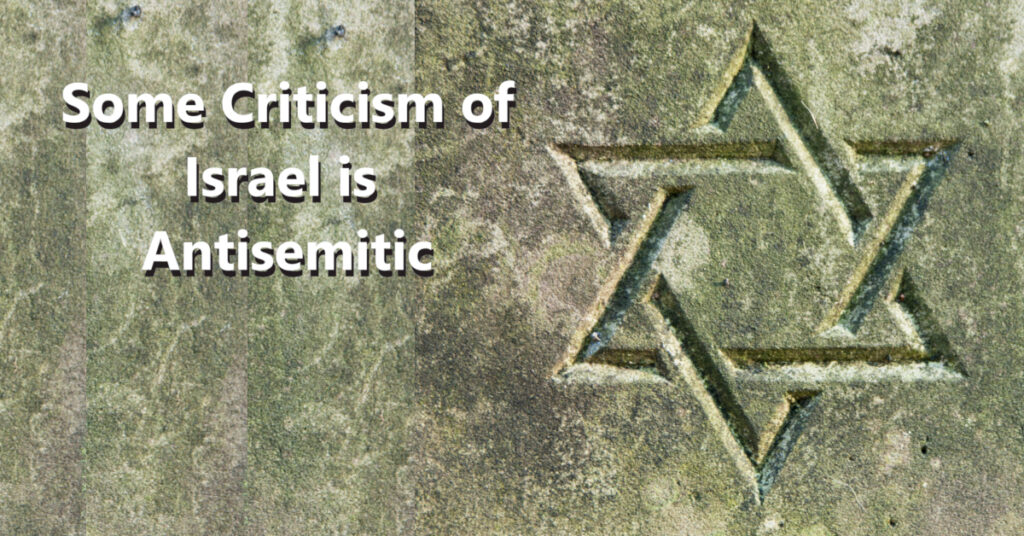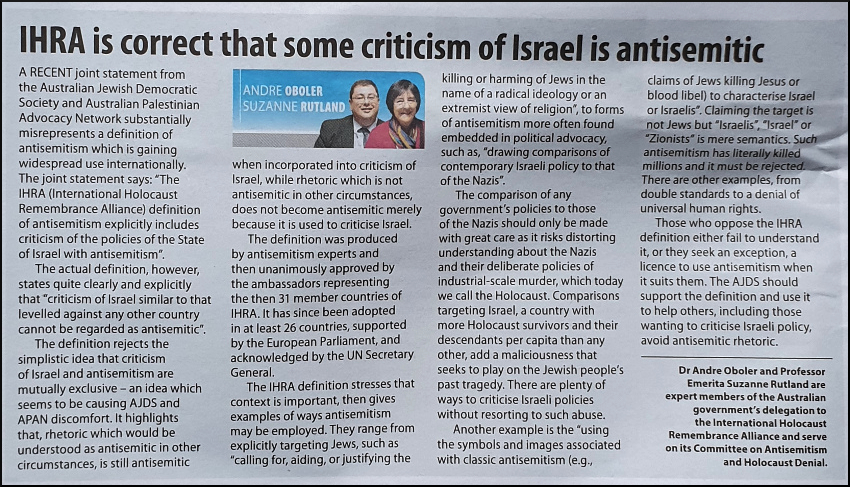
A recent article in The Australian Jewish News discusses the validity of the definition of antisemitism as defined by the International Holocaust Remembrance Alliance (IHRA). The article is printed in its entirety, below.
IHRA is correct that some criticism of Israel is antisemitic
A recent joint statement from the Australian Jewish Democratic Society and Australian Palestinian Advocacy Network substantially misrepresents a definition of antisemitism which is gaining widespread use internationally. The joint statement says: “The IHRA (International Holocaust Remembrance Alliance) definition of antisemitism explicitly includes criticism of the policies of the State of Israel with antisemitism”. The actual definition, however, states quite clearly and explicitly that “criticism of Israel similar to that levelled against any other country cannot be regarded as antisemitic”.
The definition rejects the simplistic idea that criticism of Israel and antisemitism are mutually exclusive – an idea which seems to be causing AJDS and APAN discomfort. It highlights that, rhetoric which would be understood as antisemitic in other circumstances, is still antisemitic when incorporated into criticism of Israel, while rhetoric which is not antisemitic in other circumstances, does not become antisemitic merely because it is used to criticize Israel.
The definition was produced by antisemitism experts and then unanimously approved by the ambassadors representing the then 31 member countries of IHRA. It has since been adopted in at least 26 countries, supported by the European Parliament, and acknowledged by the UN Secretary General.
The IHRA definition stresses that context is important, then gives examples of ways antisemitism may been employed. They range from explicitly targeting Jews, such as “calling for, aiding, or justifying the killing or harming of Jews in the name of a radical ideology or an extremist view of religion”, to forms of antisemitism more often found embedded in political advocacy, such as, “drawing comparisons of contemporary Israeli policy to that of the Nazis”.
The comparison of any government’s policies to those of the Nazis should only be made with great care as it risks distorting understanding about the Nazis and their deliberate policies of industrial-scale murder, which today we call the Holocaust. Comparisons targeting Israel, a country with more Holocaust survivors and their descendants per capita than any other, add a maliciousness that seeks to play on the Jewish people’s past tragedy. There are plenty of ways to criticize Israeli policies without resorting to such abuse.
Another example is the “using the symbols and images associated with classic antisemitism (e.g., claims of Jews killing Jesus or blood libel) to characterize Israel or Israelis”. Claiming the target is not Jews but “Israelis”, “Israel” or “Zionists” is mere semantics. Such antisemitism has literally killed millions and it must be rejected. There are other examples, from double standards to a denial of universal human rights.
Those who oppose the IHRA definition either fail to understand it, or they seek an exception, a license to use antisemitism when it suits them. The AJDS should support the definition and use it to help others, including those wanting to criticize Israeli policy, avoid antisemitic rhetoric.
Authors: Dr Andre Oboler and Professor Emerita Suzanne Rutland are expert members of the Australian government’s delegation to the International Holocaust Remembrance Alliance and serve on its Committee on Antisemitism and Holocaust Denial.
The above article was originally published in The Australian Jewish News

